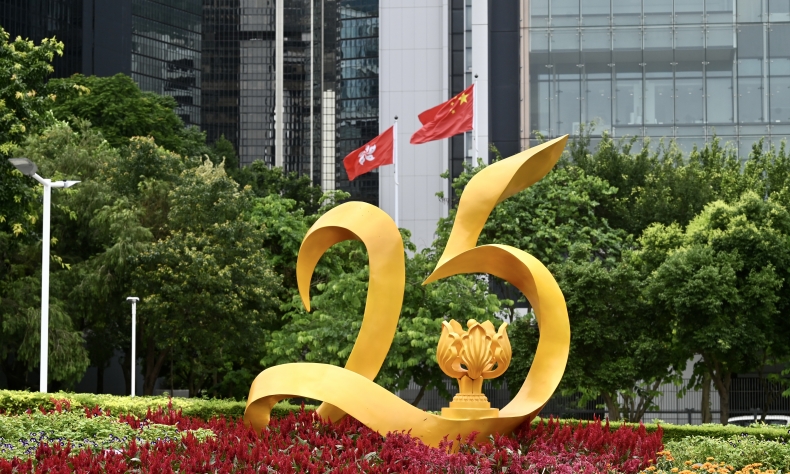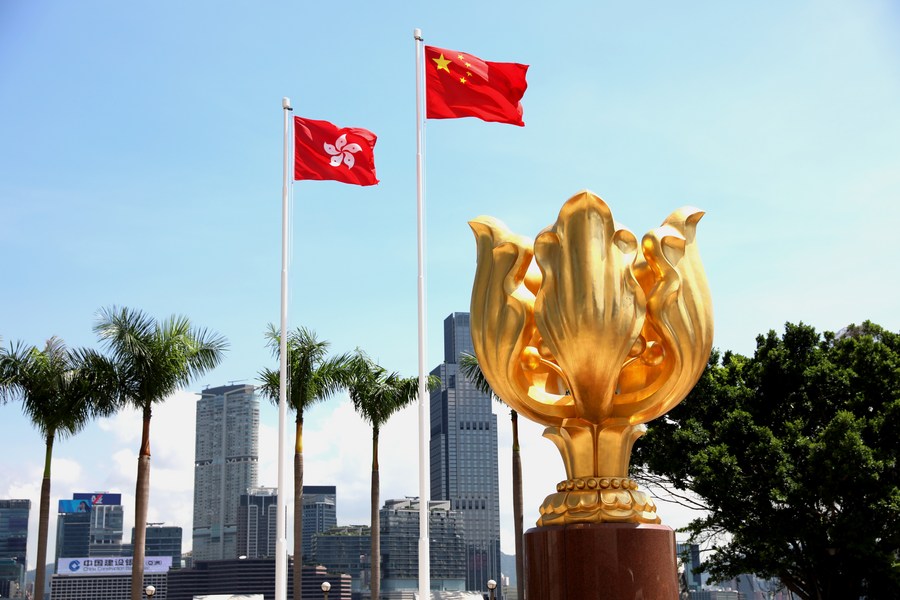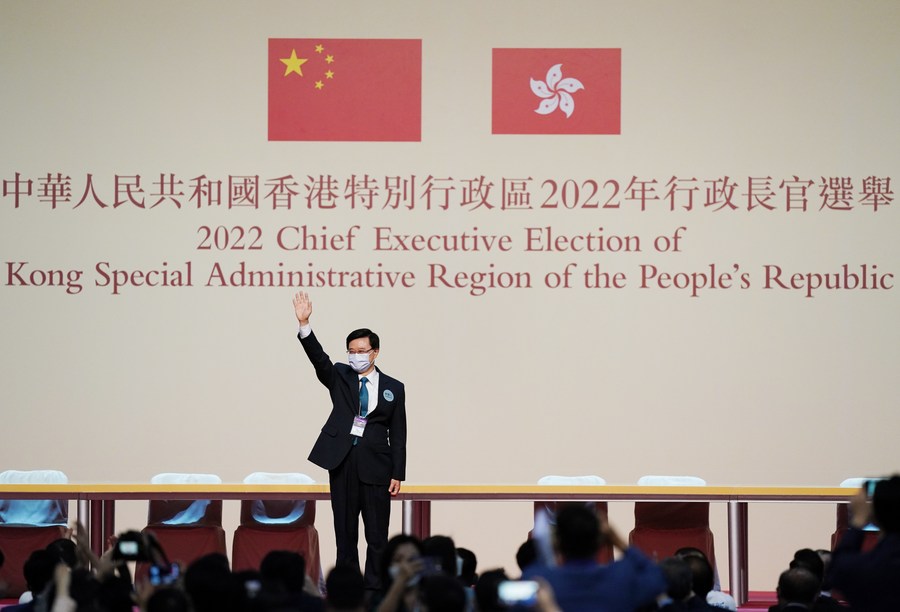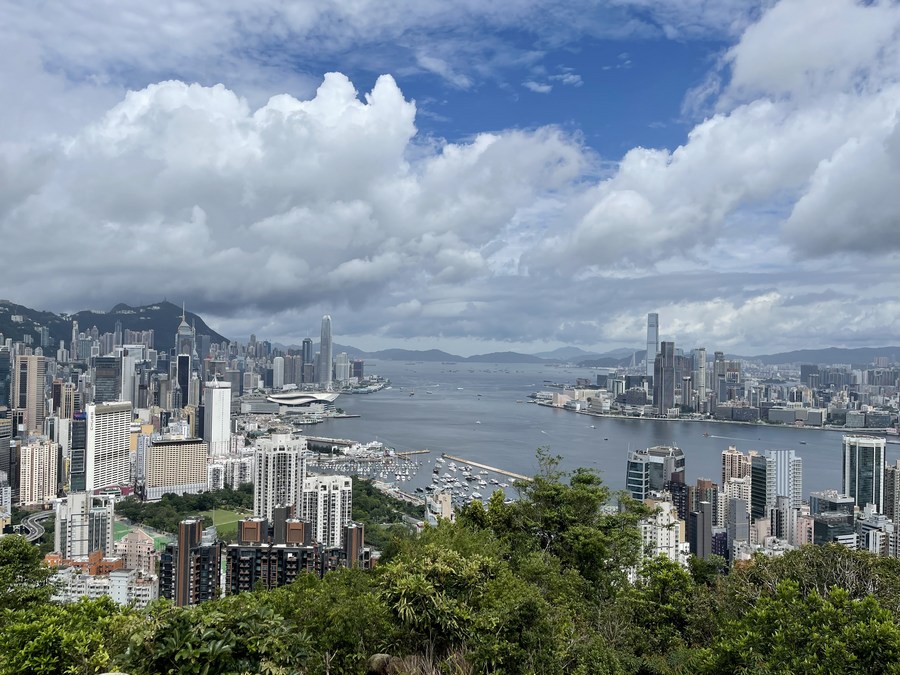Democratic Order and New Development Pattern of Hong Kong

The new electoral system has set things right, rebuilt political loyalty and meritocracy under the ‘patriots administering Hong Kong’ policy, and guided Hong Kong’s democracy on a rational and right track.
On May 8, 2022, the Election Committee members of Hong Kong Special Administrative Region (HKSAR) cast their votes to determine the next chief executive. Candidate John Lee, after securing 99.16 percent supportive votes, was elected as the sixth-term chief executive of HKSAR. The electoral system had undergone three qualified tests since improvements were made in March 2021. With the fundamental principle of “patriots administering Hong Kong” based on the “one country, two systems” principle, the system strives to create a new democratic order and development pattern for Hong Kong with balanced participation and good governance.
On April 29, Lee announced his election manifesto with the theme “Starting a New Chapter for Hong Kong Together.” The specific content covers four policy areas of governance, people’s livelihood, competitiveness, and social integration, depicting a new future for Hong Kong. Lee proposes a vigorous and resolute administrative style, and states he will work actively to achieve results. It is a conceptual revolution in Hong Kong’s governance philosophy, as well as a practical measure to actively respond to the high standards and strict requirements of determined patriots.
Anchor of prosperity and stability
“One country, two systems” is the fundamental requirement of the governance system of Hong Kong administered by a body of people who are patriotic. Sadly this fundamental principle had been severely misrepresented for a long time. Some who were opposed to China and attempted to destabilize Hong Kong had been mixed into the SAR governance structure since Hong Kong’s return to the motherland. Opposition forces within the system can also play an active role as “loyal opposition” if they can abide by the Basic Law of Hong Kong Special Administrative Region and be loyal to the HKSAR. “One country, two systems” recognizes and protects the diversity of Hong Kong’s politics. However, “one country, two systems” will never extend protection to those who are opposed to China and attempt to destabilize Hong Kong, nor will it protect any so-called pro-democracy group or individual whose goal is political subversion.

From the illegal assembly in 2014 to the extradition law turmoil in 2019, the transformation to “loyal opposition” of the Hong Kong opposition had failed completely. Local extremist forces gained dominance of the protests, and external interference forces had overridden and manipulated the direction of the protesting activities. Under these conditions, “patriots administering Hong Kong” faced big challenges. A battle between subversion and anti-subversion started in Hong Kong. The central government made a resolute decision to promulgate the Law on Safeguarding National Security in HKSAR, and emphasized the “one country, two systems” policy following the principle of “patriots administering Hong Kong.” Its basic political goal is to knock out those who are opposed to China and attempted to destabilize Hong Kong, and limit the governance of Hong Kong to patriotic individuals. This is a rational decision made by China’s central government to return to the original path of “one country, two systems” and resolutely set things right in the system.
“Patriots administering Hong Kong” is the guarantee of the “one country, two systems” policy and the anchor of Hong Kong’s prosperity and stability. On January 27, 2021, after listening to the work report of the Hong Kong chief executive via video link, President Xi Jinping pointed out that “patriots administering Hong Kong” is a fundamental principle for the stable and long-term implementation of “one country, two systems” in Hong Kong. Judging from the basic governance experience of Hong Kong since its return to the motherland, any deviation from this fundamental principle will inevitably lead to chaos in Hong Kong’s governance; Only when this fundamental principle is strictly implemented, will Hong Kong be oriented to good governance. Since the implementation of the Law on Safeguarding National Security in HKSAR, the governance of Hong Kong has achieved positive transitions “from chaos to good governance” and “from good governance to prosperity.” “Patriots administering Hong Kong” has become the anchor of its stability, stabilized the political morale and basic stance of the Pro-Establishment Camp in Hong Kong, and stabilized the basic direction of Hong Kong’s democracy and rule of law. It also gave long-term confidence and trust to people of all walks of life in Hong Kong and global investors. The new chief executive of Hong Kong, elected in accordance with the principle of “patriots administering Hong Kong,” is an important defender and leader of Hong Kong’s unity and progress, and is the core of the executive-led system.
Return to rationality
In terms of the complete legal connotation of “patriots administering Hong Kong,” we must understand that it has two implications: First, those who govern Hong Kong are patriots. Whether they are patriots or not should be determined by a qualification examination based on their understanding of legal standards and their performance in fulfilling their duties. Second, the patriots should have the ability to govern Hong Kong. This depends on whether they can put words into actions, and whether they can be strict with themselves in light of the relevant requirements of firm patriots, motivate their teams, and make progress together.
The status and requirements of a patriot are easy to achieve and meet, but the actual ability and competitiveness of governing Hong Kong cannot be accomplished in one action. For the Pro-Establishment Camp, the new election system sets higher requirements for their ability, and for the non-Pro-Establishment Camp, whether they can become a loyal opposition is a political test. Judging from the actual situation of the election of the Election Committee and the Legislative Council, the non-Pro-Establishment Camp boycotting the new electoral system for their own selfish intentions has not only led to a decisive political defeat, but also has set a bad precedent for Hong Kong’s democratic transition and progress. As the new electoral system is deeply rooted in the hearts of the people with a deep social foundation, a new democratic party will be born, and “patriots administering Hong Kong” can accommodate them in the system and realize diversity of democratic politics in Hong Kong. There will be a healthier and more sound democratic ecology and democratic order in Hong Kong.

The bottom line of “patriots administering Hong Kong” is loyalty, and the advanced requirement is meritocracy. Meritocracy is an ideal high-level democratic politics, and it is a rational governance model that focuses on the virtue, ability, and responsibility ethics of the leaders as core indicators. Electoral democracy is the starting point, but by no means the end, of this model of rational governance. In fact, the rational essence of representative democracy in the West is not elections at all, but representatives. The role of elections is periodic accountability and to grant legitimacy. Understanding democracy as election-centrism misplaces the rational nature and function of democracy, and tends to lead to a populism’s irrational governance. The development of Hong Kong since its return to the motherland has been misled by Western election-centrism to some extent. Political confrontation has delayed development and damaged the rule of law, which is the core value of Hong Kong. The new electoral system has set things right, rebuilt political loyalty with patriots administering Hong Kong, and guided Hong Kong’s democracy on a rational and right track. In the white paper titled Hong Kong: Democratic Progress under the Framework of One Country, Two Systems released on December 20, 2021, the central government reaffirmed the path of democracy in Hong Kong from the complete context of history, jurisprudence, social system, and future development. From being election-centered to being governance-centered, from loyalty confirmation to meritocracy, Hong Kong’s democracy has ushered in a new cycle of rational development.
Integrated development and new positioning
The goal of democracy is collective peace and common development, not social disintegration and development stagnation. Hong Kong is an international financial center and a cosmopolis, and has an important division of labor and functional positioning in the globalized system. The main objective of the “one country, two systems” policy is to maintain and promote Hong Kong’s inherent advantages, develop its new industries, and tap its potential. Having been caught up in political infighting and external interference over the past few years, Hong Kong has missed some opportunities for development, and it must not be delayed any longer. China is facing major changes unseen in a century, which is both an opportunity and a challenge, and the HKSAR is naturally no exception.
In fact, both the 2021 SAR government administrative report and the new chief executive’s election manifesto have tried to look at the future development of Hong Kong from a strategic perspective beyond the scope of Hong Kong, embracing integrated development as the key to the transformation and upgrading of its economy.

The purpose of integrated development is to make better use of the strategic opportunities of national development for Hong Kong and to make better use of Hong Kong’s strengths for the development of the country. The development of the Guangdong-Hong Kong-Macao Greater Bay Area has been delayed due to the extradition law turmoil in Hong Kong and the COVID-19 pandemic, and the process of integrated development has faced certain challenges. However, the Hengqin Plan and Qianhai Plan released by the central government in September 2021, as well as the Northern Metropolitan Plan proposed by Hong Kong, provide more accurate and actionable guidelines and routes for Hong Kong’s integrated development. According to the Northern Metropolitan Plan, Hong Kong will promote the innovation and technology industry, covering research and development and manufacturing, which is a milestone event in its economic history. According to the 14th Five-Year Plan (2021-2025) Hong Kong will be built into eight centers, including a financial center, a trade center, as well as a newly developed innovation and technology center, and a Sino-foreign cultural and artistic exchange center. If Hong Kong can make full use of national policy, accurately judge the trend of globalization, and be proficient at taking advantage of every major development opportunity, it is possible for Hong Kong to achieve extraordinary results under the “one country, two systems” policy. Hong Kong’s international status, hub advantages, institutional foundation and innovation capabilities are still sound and systematic. As long as political stability, social solidarity, and solidarity with the country can be maintained and consolidated, its development prospects are bound to be bright.
This year marks the 25th anniversary of Hong Kong’s return to the motherland. Its democratic and legal system has undergone fluctuations, struggles, and various kinds of reconstruction, and is experiencing a major transition from “good governance to prosperity” centered on “patriots administering Hong Kong.” As a result, its public sentiment and global confidence are rapidly recovering and strengthening. “One country, two systems” is China’s long-term constitutional strategy for peaceful reunification and modernization, and China’s firm institutional bridge for reform, opening-up, and peaceful development. Hong Kong will be able to better undertake the important responsibilities of its own development and play the role of connecting the country with the global market. The new system of election, the new chief executive, and the new governance system composed of capable patriots will form a solid foundation for the future development of Hong Kong.
Tian Feilong is an associate professor at the Law School of Beihang University, and a member of the Chinese Association of Hong Kong & Macao Studies.
 Facebook
Facebook
 Twitter
Twitter
 Linkedin
Linkedin
 Google +
Google +










